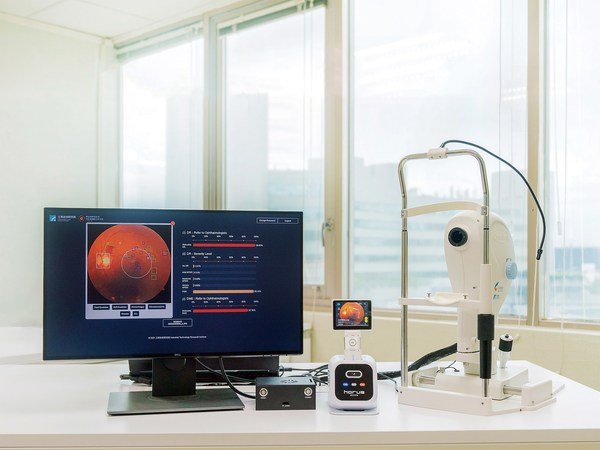ITRI Introduces Point-of-Care AI-DR Software for Rapid Diagnosis of Diabetic Retinopathy and Diabetic Macular Edema
11 November 2022 | Friday | News

The Industrial Technology Research Institute (ITRI), Taiwan's largest and one of the world's leading high-tech applied research institutions, introduced Point-of-Care AI-DR, the first AI-assisted system which can be integrated into handheld and desktop fundus cameras commonly used in hospitals and clinics to detect diabetic retinopathy (DR) and diabetic macular edema (DME). Point-of-Care AI-DR is a 2022 R&D 100 Awards winner in the software/services award category.
Point-of-Care AI-DR is the first AI-based solution that can locate four main lesions, classify five severity levels of DR, and determine whether a patient should be referred to an ophthalmologist.
Point-of-Care AI-DR diagnoses DR and DME in 5 to 10 seconds and instantly assesses image quality before diagnosis to prevent misinterpretation by the AI. It marks lesions and assesses the corresponding severity levels based on the fundus images. Further, Point-of-Care AI-DR can identify 14 other common ocular fundus abnormalities, including retinal related diseases, changes in blood vessels, and optic nerve related diseases.
Point-of-Care AI-DR is easy to use, so general physicians can perform early screening for DR and DME complications. It also can determine whether a patient should be referred to an ophthalmologist. Screening through general physicians increases screening rates, reduces treatment costs and improves patient outcomes by enabling early detection.
According to the International Diabetes Foundation, 537 million adults globally between 20 and 79 years old were living with diabetes in 2021, and the number is projected to increase to 643 million by 2030 and 783 million by 2045. According to the U.S. National Eye Institute, more than half of people with diabetes will develop DR and about one in 15 will develop DME.
By identifying lesions and severity stages of DR and DME, Point-of-Care AI-DR improves diabetes health monitoring and management and helps lower the risks of vision loss or blindness caused by diabetic eye complications. Physicians can effectively grasp the patient's diabetes development status by tracking the changes in fundus symptoms over time. This is crucial for diabetes management, because the changes in fundus symptoms can be monitored more reliably than blood sugar levels, which patients can alter immediately before examinations.
"Point-of-Care AI-DR is a collaboration of human and artificial intelligence through the expertise of ophthalmologists and AI analysis. It uses complementary medical AI models to perform individual diagnostic tasks such as classifying and detecting symptoms to improve the efficiency of overall interpretation," said Dr. Pang-An Ting, ITRI general director of Information and Communications Research Laboratories.
To create Point-of-Care AI-DR, ITRI engaged 50 ophthalmologists who collected and labeled 150,000 fundus images as the training data for robust AI models. As a result, Point-of-Care AI-DR outperforms existing products in terms of sensitivity (>98%) and specificity (>96%) in DR diagnosis and helps non-ophthalmologists perform rapid point-of-care DR screening like ophthalmologists. It can support all existing fundus cameras worldwide and be used to create different types of solutions such as edge AI systems, standalone web applications, and private/public cloud-based services.
Point-of-Care AI-DR is the first AI-based solution for DR and DME detection that can:
- Locate four main lesions: microaneurysms, hemorrhages, soft exudates, and hard exudates, and detect two anatomical landmarks: optic disc and macular area
- Classify five severity levels of diabetic retinopathy: no DR, mild NPDR, moderate NPDR, severe NPDR and PDR
- Produce binary classifications of DR and DME so general practitioners can provide data-informed decisions for referrals to ophthalmologists
Point-of-Care AI-DR is available for licensing. One example of Point-of-Care AI-DR licensing is VeriSee DR by Acer. Companies interested in licensing should contact ITRI.
Most Read
- How Does GLP-1 Work?
- Innovations In Magnetic Resonance Imaging Introduced By United Imaging
- Management of Relapsed/Refractory Multiple Myeloma
- 2025 Drug Approvals, Decoded: What Every Biopharma Leader Needs to Know
- BioPharma Manufacturing Resilience: Lessons From Capacity Expansion and Supply Chain Resets from 2025
- APAC Biopharma Review 2025: Innovation, Investment, and Influence on the Global Stage
- Top 25 Biotech Innovations Redefining Health And Planet In 2025
- The New AI Gold Rush: Western Pharma’s Billion-Dollar Bet on Chinese Biotech
- Single-Use Systems Are Rewiring Biopharma Manufacturing
- The State of Biotech and Life Science Jobs in Asia Pacific – 2025
- Asia-Pacific Leads the Charge: Latest Global BioSupplier Technologies of 2025
- Invisible Threats, Visible Risks: How the Nitrosamine Crisis Reshaped Asia’s Pharmaceutical Quality Landscape
Bio Jobs
- Sanofi Turns The Page As Belén Garijo Steps In And Paul Hudson Steps Out
- Global Survey Reveals Nearly 40% of Employees Facing Fertility Challenges Consider Leaving Their Jobs
- BioMed X and AbbVie Begin Global Search for Bold Neuroscience Talent To Decode the Biology of Anhedonia
- Thermo Fisher Expands Bengaluru R&D Centre to Advance Antibody Innovation and Strengthen India’s Life Sciences Ecosystem
- Accord Plasma (Intas Group) Acquires Prothya Biosolutions to Expand Global Plasma Capabilities
- ACG Announces $200 Million Investment to Establish First U.S. Capsule Manufacturing Facility in Atlanta
- AstraZeneca Invests $4.5 Billion to Build Advanced Manufacturing Facility in Virginia, Expanding U.S. Medicine Production
News











